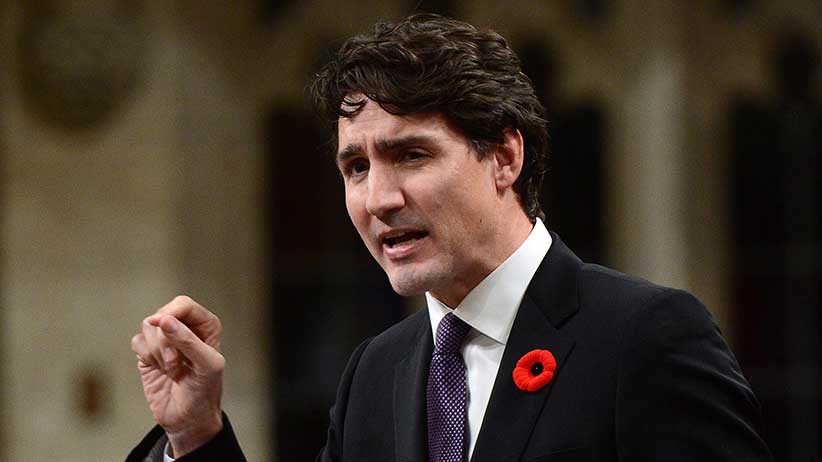Justin Trudeau, the Paradise Papers and his ‘super rich friends’
In Question Period on Monday the PM was back in the hot seat facing questions about Liberals and tax shelters
Prime Minister Justin Trudeau stands during question period in the House of Commons on Monday, Nov. 6, 2017 (Sean Kilpatrick/CP)
Share

Prime ministers past looked in on question period today, and none are likely to have envied the man now occupying that role, on a day when the seat was particularly warm.
A consortium of news outlets on Sunday revealed the Paradise Papers, a cache of correspondence and other records detailing tax minimization and avoidance strategies employed by thousands of individuals and corporate entities. Canadians associated with the documents, according to the media reports, included Stephen Bronfman and Leo Kolber—major Liberal Party fundraisers present and past, respectively.
The revelations provided a handy new line of questioning for the opposition, for whom tax policy, and its effects on government members, has been a particular interest in recent weeks. The personal finance choices of Finance Minister Bill Morneau, absent from the proceedings, have thus far been the main attraction, but today they were but a glancing reference in the long list of supposed improprieties the Conservatives used to preface their inquiries.
Instead, with Joe Clark, John Turner, Brian Mulroney and Paul Martin watching, the focus was on the accounting practices of another Trudeau associate. Opposition MPs accused the government of failing to act to prevent the wealthy—or “their super rich friends, and those working hard to join them,” in Erin O’Toole’s phrasing (a twist on the Liberals’ preferred phrase for the middle class)—from using tax havens to shelter their money. They focused particularly on Bronfman, the Liberal Party’s revenue chair, variously describing him as Prime Minister Justin Trudeau’s friend, advisor and “bagman”.
READ MORE: Justin Trudeau is getting cocky about the economy. Watch out.
For his part, Stephen Bronfman said in a Monday morning statement that “Stephen Bronfman never funded nor used offshore trusts,” and that “Stephen Bronfman had no other direct or indirect involvement whatsoever” with the Kolber family corporate entity to which the CBC and Toronto Star tied the Bronfman family corporate entity.
Stephen Bronfman was not in the chamber during question period, so the opposition were forced to make their Paradise Papers inquiries of the Prime Minister, even if Trudeau insisted that he preferred to let “individuals comment on their own situation.”
RELATED:
The Prime Minister and the Minister of National Revenue Diane Lebouthillier more or less fielded the opposition’s questions by refusing to accept their premise. “Canadians know very well that in our first two budgets we have invested almost $1 billion to combat tax evasion,” Trudeau said. Those who tuned into question period, where Trudeau and Lebouthillier cited that figure nine more times between them, will have heard of it, anyway.
The former prime ministers were in the building to mark the sesquicentennial of Canada’s first Parliament’s first meeting. Martin and Mulroney were also named in the Paradise Papers, though the MPs did not address any of their questions to the gallery where they were seated. (That would, after all, be a breach of the rules). So was the report-denying Jean Chrétien, not present. And Stephen Harper, also absent, also received a reference, or his government did at least, when Lebouthillier suggested it hadn’t made fighting tax evasion a priority.
Still, Trudeau is the one in charge now, and the steady stream of impropriety, accusations and questionings of ethics have consumed his question period appearances for weeks now. Sitting in the gallery sounds more fun.
MORE ABOUT JUSTIN TRUDEAU:
- Science in Canada needs funding, not photo-ops
- Justin Trudeau is getting cocky about the economy. Watch out.
- The risky tag team of Julie Payette and Justin Trudeau
- Stephen Harper’s NAFTA memo shows how little the former PM has changed
- Harper to Trudeau: Canada is ‘napping on NAFTA’
- Canadians feel Trudeau’s image on the world stage is his biggest asset: Poll
- Welcome to your post-process years, Justin Trudeau